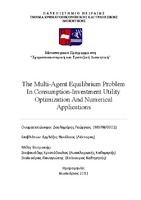The multi-agent equilibrium problem in consumption-investment utility optimization and numerical applications

Προβολή/
Θεματική επικεφαλίδα
Portfolio management ; Securities -- Prices ; Capital assets pricing model ; Investment analysis ; InvestmentsΠερίληψη
We study an economy with finite heterogeneous agents over a finite time horizon, who differ in their endowments and utilities. Each agent has individual commodity earnings streams, and is endowed with a set of productive assets which produce commodity dividend streams. The agents can trade commodity and productive assets in order to hedge the risks. The profits can be invested in financial assets. Each agent chooses a commodity consumption process and manages his portfolio in order to maximize his expected total utility from consumption of commodity, over a finite horizon subject to the constraint that his wealth at the terminal time must be nonnegative. When equilibrium prices are accepted by the individual agents during the determination of their optimal consumption and portfolio policies, the commodity is entirely consumed as it received, all productive assets are exactly owned and all financial assets are held in zero net supply. In order to replace many agents with distinct utility functions and incomes, we introduce a "representative agent", who represents their individual interests and has their aggregate income. The goal of this thesis is to establish the existence and uniqueness of "equilibrium" commodity spot price process and productive asset prices in a multi- agent economy.


